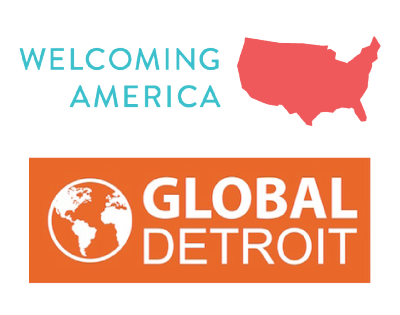WE Global Network Launches Network for Immigrant Economic Development Initiatives Across America’s Rust Belt
Initiatives across the Rust Belt join historic partnership with Welcoming America and Global Detroit to welcome immigrants and revitalize regional economies. As the WE Global Network launches, Presidential taskforce recognizes efforts as a model national practice.
Today, Welcoming America, Global Detroit, and more than a dozen economic development initiatives throughout the nation’s Rust Belt launched the Welcoming Economies Global Network (WE Global Network). It is comprised of groups from across the Midwest working to tap into the economic development opportunities created by welcoming immigrants.
“In the 20th century, the Rust Belt housed industrial powerhouses like the U.S. steel, coal, and auto industries, but today it is entrepreneurial partnerships between immigrants and local communities that are fueling the region’s economies,” said David Lubell, Executive Director of Welcoming America. “The WE Global Network recognizes that if we’re to remain competitive in the global economy, we must support and maximize the efforts of local initiatives that welcome, retain, integrate, and empower immigrant communities.”
As regional leaders of immigrant innovation, the WE Global Network is comprised of local immigrant economic development organizations working in 10 states to promote immigrants as valued contributors to local economies. Members of the network benefit from peer-to-peer learning exchanges, policy and research tools developed for immigrant economic development organizations, access to technical assistance, and other capacity building resources.
“Competing in a twenty-first century economy will require taking full advantage of our most important resource—our people, and that means welcoming the new Americans who are starting businesses, committing to our community, and helping build a stronger local economy” said Global Detroit Executive Director Steve Tobocman. “Communities across the country and around the world are in a race to the top to attract the human capital that will allow them to thrive in a global economy. Becoming a more welcoming place for immigrants gives us a leg up in that competition and helps us retain talented people of all backgrounds.“
The WE Global Network launch comes on the heels of yesterday’s White House release of a report featuring these efforts as a national best practice. Created by the White House Task Force on New Americans, the report affirms that immigrants and refugees contribute significantly to the United States’ continued economic prosperity and are also critical to our country’s social and cultural fabric. The Task Force is an interagency effort to develop a coordinated federal strategy to better integrate immigrants and refugees and build welcoming communities. Click here for the report, which will soon be available at: www.whitehouse.gov/newamericans.

